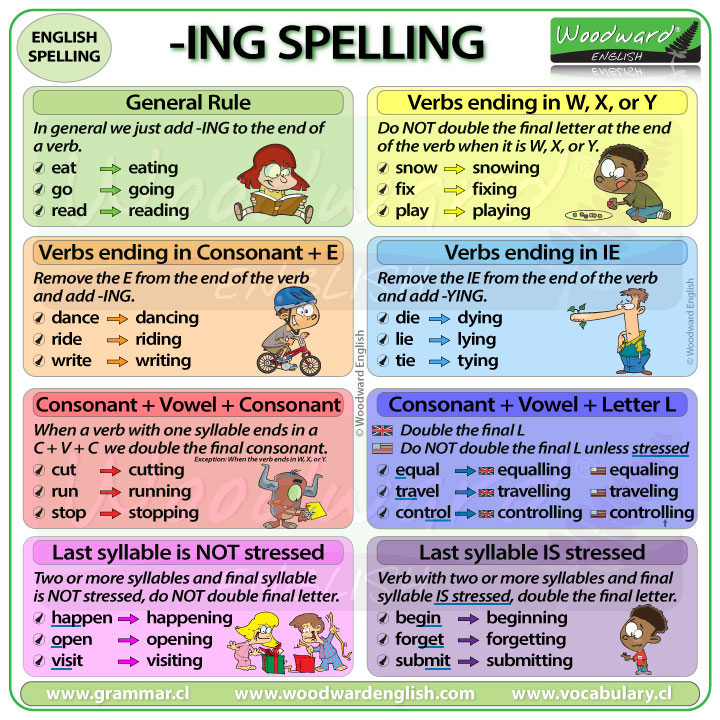To write a verb ending in -ING you need to know the correct spelling.
General Rule
In general you just add -ING to the end of a verb.
| Infinitive | ING form |
| to eat | eating |
| to go | going |
| to look | looking |
| to read | reading |
- I am eating
- They are going to the beach.
- He is looking at the painting
- She is reading a book.
BUT there are some exceptions!
-ING Spelling Exceptions
Verbs ending in Consonant + E
When a word ends in consonant + E, we remove the E from the end and add ING.
| Infinitive | ING form |
| to dance | dancing |
| to make | making |
| to ride | riding |
| to write | writing |
- She is dancing.
- I am making a sandwich.
- He is riding his bike.
- Susan is writing a letter.
Verbs ending in IE
But when a word ends in I + E, we remove the IE from the end and add YING.
| Infinitive | ING form |
| to die | dying |
| to lie | lying |
| to tie | tying |
- Many people are dying from the virus.
- I know you are lying to me.
- He is tying his laces.
Verbs with one syllable ending in consonant + vowel + consonant
When a verb with one syllable ends in consonant + vowel + consonant, we double (make two of) the final consonant and add ING.
| Infinitive | ING form |
| to cut | cutting |
| to run | running |
| to sit | sitting |
| to stop | stopping |
| to swim | swimming |
- He is cutting an onion.
- They are running in the park.
- We are sitting on our chairs.
- The policeman is stopping the traffic.
- She is swimming in the pool.
Verbs ending in W or X or Y
When a word ends in a W, X or Y, we do NOT double that final letter before add ING. Notice how there is a vowel before each letter.
| Infinitive | ING form |
| to enjoy | enjoying |
| to fix | fixing |
| to follow | following |
| to play | playing |
| to snow | snowing |
- Are you enjoying the party?
- The mechanic is fixing the car.
- I think someone is following
- He is playing with his marbles.
- It is snowing right now.
Last syllable NOT stressed
When a verb has two or more syllables and the last syllable is NOT stressed, we do NOT double the final letter before adding ING.
The verb OPEN has two syllables…. O + PEN.
Since the first syllable is stressed (O-pen) and not the last syllable (we do not say o-PEN), we do not double the final N.
So we just add ING to the end and it now becomes OPENING.
Here are some more examples. Listen to how the last syllable of each verb is NOT stressed. Usually the first syllable is stressed.
| Infinitive | ING form |
| to happen | happening |
| to listen | listening |
| to offer | offering |
| to open | opening |
| to visit | visiting |
| to whisper | whispering |
- What is happening right now?
- I am listening to the radio.
- My boss is offering me a new position.
- They are opening their presents.
- They are visiting the museum.
- They are whispering because the baby is asleep.
EXCEPTION:
The verb kidnap is an exception to this rule. The first syllable has the stress (KID-nap) we for this word we do double the final P.
- Kidnap -> kidnapping
C+V+C Last syllable IS stressed
When a verb has two or more syllables and ends in a consonant + vowel + consonant and the last syllable IS stressed, we double the final consonant before adding ING
The verb BEGIN has two syllables…. BE + GIN.
Since the last syllable is stressed (be-GIN) and not the first syllable (we do not say BE-gin), we double the final N.
So we just add an extra N before ING and it now becomes BEGINNING.
Here are some more examples. Listen to how the last syllable of each verb IS stressed.
| Infinitive | ING form |
| to admit | admitting |
| to begin | beginning |
| to forget | forgetting |
| to refer | referring |
| to submit | submitting |
| to upset | upsetting |
- Admitting your mistake was a brave thing to do.
- She’s beginning to feel tired.
- I’m sure I am forgetting
- Are you referring to this one or that one?
- He is submitting a new proposal.
- I’m sorry for upsetting
You can see we only double consonants in stressed syllables.
Verbs ending in consonant + vowel + L
There are two ways of spelling a verb ending in a consonant + vowel + L.
In BRITISH English, you double the final L.
In AMERICAN English, you do NOT double the final L unless it is stressed.
The first syllable of the verb travel is stressed (TRA-vel)
The last syllable of the verb control is stressed (con-TROL)
| Infinitive | ING form (British English) |
ING form (American English) |
| to equal | equalling | equaling |
| to travel | travelling | traveling |
| to control | controlling | controlling * |
* Notice how there is a double L in controlling in American English. That is because the last syllable of the verb control is stressed (con-TROL)
- Sales are currently equalling those the same time last year.
- There were travelling around Europe until the virus stopped everything.
- They are now controlling the company.
Summary Chart

